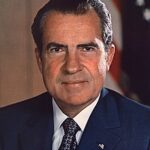The Strategic Decision
President Nixon revolutionized Cold War diplomacy through his groundbreaking détente policy. This approach prioritized negotiation over confrontation with the Soviet Union. Nixon abandoned the rigid containment strategy that dominated previous administrations. Instead, he pursued pragmatic engagement with America’s primary adversary. 📊 The strategy represented a fundamental shift in U.S. foreign policy thinking.
SALT I Treaty Achievement
The Strategic Arms Limitation Treaty became détente policy’s crowning achievement in May 1972. Nixon and Soviet leader Leonid Brezhnev signed the historic agreement in Moscow. The treaty limited intercontinental ballistic missiles and submarine-launched ballistic missiles. It froze strategic nuclear weapons at existing levels for five years. ⚠️ This marked the first successful nuclear arms control agreement between superpowers.
Diplomatic Framework Creation
Nixon’s détente policy established crucial diplomatic channels between Washington and Moscow. Regular summit meetings became standard practice under this framework. Trade agreements and cultural exchanges flourished during this period. The policy created mechanisms for crisis communication and conflict prevention. 🌍 These diplomatic innovations helped prevent accidental nuclear confrontations throughout the 1970s.
Impact:
Immediate Nuclear Safety Benefits
The SALT I Treaty delivered immediate nuclear risk reduction for global security. Both superpowers agreed to limit their most dangerous weapons systems. The treaty prevented an escalating arms race that could have bankrupted both nations. 📉 Defense spending growth slowed significantly following the agreement’s implementation.
Long-term Diplomatic Legacy
Nixon’s détente policy created lasting frameworks for superpower negotiations. Future arms control agreements built upon SALT I’s foundational principles. The Helsinki Accords of 1975 extended détente concepts to European security. 🌍 These diplomatic mechanisms survived even during later periods of increased tensions.
Global Stability Enhancement
Détente policy reduced the likelihood of nuclear conflict during critical Cold War years. Regional conflicts became less likely to escalate into superpower confrontations. Allied nations gained confidence in American diplomatic leadership and restraint. The policy demonstrated that ideological enemies could find common ground on existential threats. 🕊️ This approach influenced international relations theory for decades. Many historians credit détente policy with preventing nuclear war during the volatile 1970s period. The framework established precedents for modern nuclear diplomacy and arms control negotiations.
